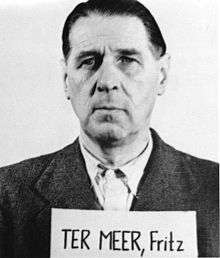Fritz ter Meer
| Fritz ter Meer | |
|---|---|
 Fritz ter Meer | |
| Born |
4 June 1884 Uerdingen, Rhine Province, Prussia, Germany |
| Died |
27 October 1967 (aged 83) Leverkusen, Germany |
| Nationality | German |
| Fields | Chemistry |
| Institutions | IG Farben, Bayer |
Fritz ter Meer (4 July 1884 – 27 October 1967) was a German chemist.
From 1925 to 1945 Fritz ter Meer was on the board of IG Farben AG. He was involved in the planning of Monowitz concentration camp, a satellite camp of KZ Auschwitz. Fritz ter Meer was sentenced to seven years in prison in the Nuremberg Trials in 1948. After he was released in 1951 he became supervisory board chairman (Aufsichtsratsvorsitzender) of Bayer AG.
Early life
Fritz ter Meer was the son of Edmund ter Meer (1852–1931), who founded the chemical company Teerfarbenfabrik Dr. E. ter Meer & Cie in Uerdingen, which in 1925 became part of IG Farben. His family tree can be traced back to the 15th Century.
After completing his schooling from 1903 to 1908 ter Meer studied in France and Germany also briefly chemistry and law. He received his doctorate in 1909 in Berlin with regard to the thesis of the ether Isonitrosoketonen. Subsequently, in-depth studies followed the dye chemistry in Krefeld and abroad in France and England.
Career
Thereafter, he worked in the family-owned company Dr. E. ter Meer & Co., where he held senior positions and in 1919 became a member of the Board. After the merger he worked for IG Farben until 1945.
From 1925 to 1945 Fritz ter Meer was on the board of IG Farben AG. He was also from 1932 a member of the Working Committee and the Technical Committee, Head of Division II in the War Ministry and the defense industry. In May 1937, he joined the NSDAP.
During World War II
On 7 September 1939 he and Henry agreed with the Army Ordnance Hörlein the production of the nerve gas tabun. More than 100 prisoners of war were used during construction of the designated poison gas factory in Dyhernfurth.
He was involved in the planning of Monowitz concentration camp, a satellite camp of KZ Auschwitz and responsible for helping build the IG Farben Buna Werke factory at Auschwitz, which conducted human experiments and held some 25,000 forced laborers under deplorable conditions.
In September 1943 he became General Agent for Italy, the Reich Minister for armaments and war production. In 1943 ter Meer received the Knight's Cross of War Merit Cross.
Post-war
After his arrest in April 1945, ter Meer was tried at the IG Farben Trial on 30 July 1948 for looting and enslavement in the context of the concentration camp Auschwitz III Monowitz. He was sentenced to seven years imprisonment. When he was interviewed in the process, asked whether he had considered the tests on humans in Auschwitz to be justified, he replied that this was irrelevant:
"They were prisoners thus no particular harm was inflicted, as they would have been killed anyway."
He was released early in the summer of 1950 because of "good behavior" in prison for war criminals from the prison in Landsberg and was given the removal of the restrictive clause of the Allied War Crimes Act No. 35 in 1956 and became Chairman of Bayer AG. In subsequent years, he also took on board positions at a number of other companies, including, inter alia, Theodor Goldschmidt AG, Commerzbank AG, Bank Association, Duewag, VIAG and Union Bank AG, West Germany. His achievements in the reconstruction of the chemical industry in Germany are considered significant.
He retired in 1961.
In his memory, his employer set up the Fritz-ter-Meer-Stiftung, now called the Bayer Science & Education Foundation, which promotes chemistry students through scholarships.
References
- Heine, Jens Ulrich (1990). Verstand und Schicksal. Die Männer der I.G. Farbenindustrie A.G. (1925-1945). Weinheim; New York: VCH. ISBN 978-3-527-28144-2.